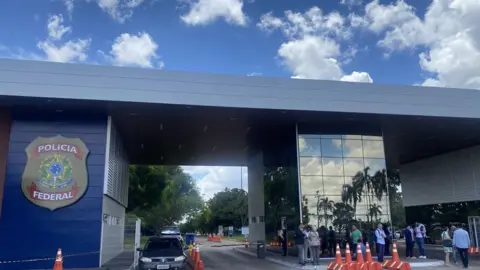Brazil Congress riot: Conditions of detainees come under scrutiny
 BBC
BBCAt a police academy in the lush green outskirts of Brazil's capital, hundreds of people are anxiously waiting to learn their fate, with the grim prospect of a prison sentence looming over them.
The detainees inside are among more than 1,500 people taken into custody following the riot at Brazil's Congress on 8 January, which authorities have blamed on right-wing supporters of former President Jair Bolsonaro.
Mounting concerns over the conditions inside the facility - as well as rumours and disinformation running rampant on social media - have prompted an outcry from some conservative Brazilian politicians.
In yet another similarity with the 6 January 2021 riot at the US Capitol and its aftermath, some are now calling for an investigation into the detentions to be launched.
The BBC was not allowed inside the facility on Tuesday.
But officials have repeatedly defended their handling of the detainees - and there has been no evidence to suggest that the worst of the allegations are based in reality.
Images posted to social media purport to offer a glimpse of what the detainees face inside: rows of people sleeping on a crowded and dirty gymnasium floor, allegedly with limited access to food and water.

Telma Viera, an ardent Bolsonaro supporter who visited two friends held inside, told the BBC that while staff inside the facility - whom she called "fellow patriots" - were "doing their best" to take care of the detainees, the makeshift nature of the facility meant that conditions were difficult.
"They can do nothing for the people who are there, including old people, and children. They are just camping there, with sick people," she said.
"They [the detainees] are doing what they can, setting up tents, praying," she added. "Some have had people bring them little things from home, but mostly they are praying and thanking God for each other's help."
Concerns over the conditions at the facility have been amplified by the rapid spread of false information on social media platforms such as TikTok and Twitter.
Late on Monday, for example, Brazil's Federal Police were forced to publicly dispel a rumour - which had already been shared hundreds of thousands of times - that a 77-year-old woman had died inside.
The social media posts haven't escaped the attention of conservative lawmakers, several of whom attempted to enter the facility on Tuesday.
Neucimar Fraga, a congressman from the right-wing Progressitas Party, said "rumours have reached Congress via social media", requiring a response from politicians.
"[This includes] mistreatment, a lack of food… as well as inadequate room to sleep and inadequate bathroom breaks. Some people were here 36 hours before their first meal," he alleged. "I've heard of detainees of 90 years old, people who could not physically cause any harm to Brazil.
"We need to check what is fact," he added. "As opposed to what is rumours."
To do so, Mr Fraga and other lawmakers have said they hope to form a commission to examine the arrests and the condition in which detainees have been held.
"We have a constitutional right to this information, and that's a process that needs to happen quickly," he added. "That's why we are here."
Of the approximately 1,500 people arrested and brought to the police academy after the riot, officials say that nearly 600 have been taken to other facilities, where police officials have five days to formally charge them.
Just over 520 people have so far been released - some of whom shouted messages of continued defiance from buses as they were driven away from the academy on Tuesday.
"Our fight against Red Communism will never rest!" an elderly man yelled from the back of the bus, alongside several women waving Brazilian flags.
On Monday, thousands of Brazilians took to the streets of cities across the country - with many participants expressly condemning the rioters and calling on the full force of the law to be brought to bare on them.
With additional reporting from Jessica Cruz
